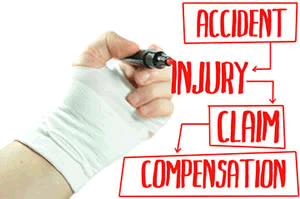Can I sue for injuries even after receiving workers comp?
Workers' compensation insurance provides compensation to workers who are injured while performing their normal job responsibilities. It was instituted early in the 1900's in the United States. Workers' compensation is considered a trade-off. Workers receive immediate compensation for medical expenses, lost wages and death benefits, regardless of fault, but in most cases they forfeit their right to receive additional compensation by filing a personal injury lawsuit.
So in most cases, if you have been injured in the normal course of your employment and you have received workers' compensation, you will not be able to file an additional lawsuit against your employer. There are, however, specific instances where additional compensation may be awarded. Recently on our injury forum a user asked, "Can I sue for my injuries even after receiving workers' compensation benefits?
When Can I sue for a work comp case?
Although workers' compensation insurance will generally cover the cost of your workplace injuries, there are specific instances where you may be able to sue for additional compensation. Personal injury or product liability cases may be allowed in the following situations:
- Workers injured from a defective product may be able to sue the manufacturer of the product for additional compensation for their injuries. To win a product liability case, the plaintiff must prove a violation of the applicable design and manufacturing safety standards of the defective product.
- Workers injured from the intentional injuries of their employer may file a personal injury lawsuit against their employer and seek punitive damages.
- Workers injured and who have chemical burns, poisoning, cancer, lung disease, asbestosis, mesothelioma from a toxic substance (i.e. asbestos, benzene, chromium compounds, or silica) may sue the manufacturer or maker of the product.
- Workers injured from the actions of a third party may file an injury claim against the person who injured them.
- Workers injured working for a company which does not have workers' compensation insurance may be able to sue their employer for compensation for their injuries.
What if workers' compensation does not cover my expenses?
Workers who suffer a permanent disability or injury while performing their normal job duties may be able to seek additional compensation from Social Security Disability Insurance (SSDI) if they are not able to return to work.
Workers may receive both workers' compensation and SSDI benefits, but benefits can be reduced. Because state laws vary, it's important to discuss your workers' compensation case with someone familiar with the laws in your state before applying for SSDI benefits.
To qualify for SSDI you will have to prove your have a condition which is so severe you are unable to work for at least 12 continuous months, you are insured for SSDI benefits, and your condition does not allow you to work or perform substantial gainful activity.
When do I need a work comp lawyer?
Most claimants with minor injuries will not need legal help to file their work comp case. They can simply notify their employer and receive benefits. Workers with severe, permanent or substantial injuries may want legal assistance.
Related Pages
Latest Question
Prenuptial agreement when can it be disregarded?
Prenuptial agreements are generally enforced but they can be disregarded if certain conditions are met.Category: Divorce




